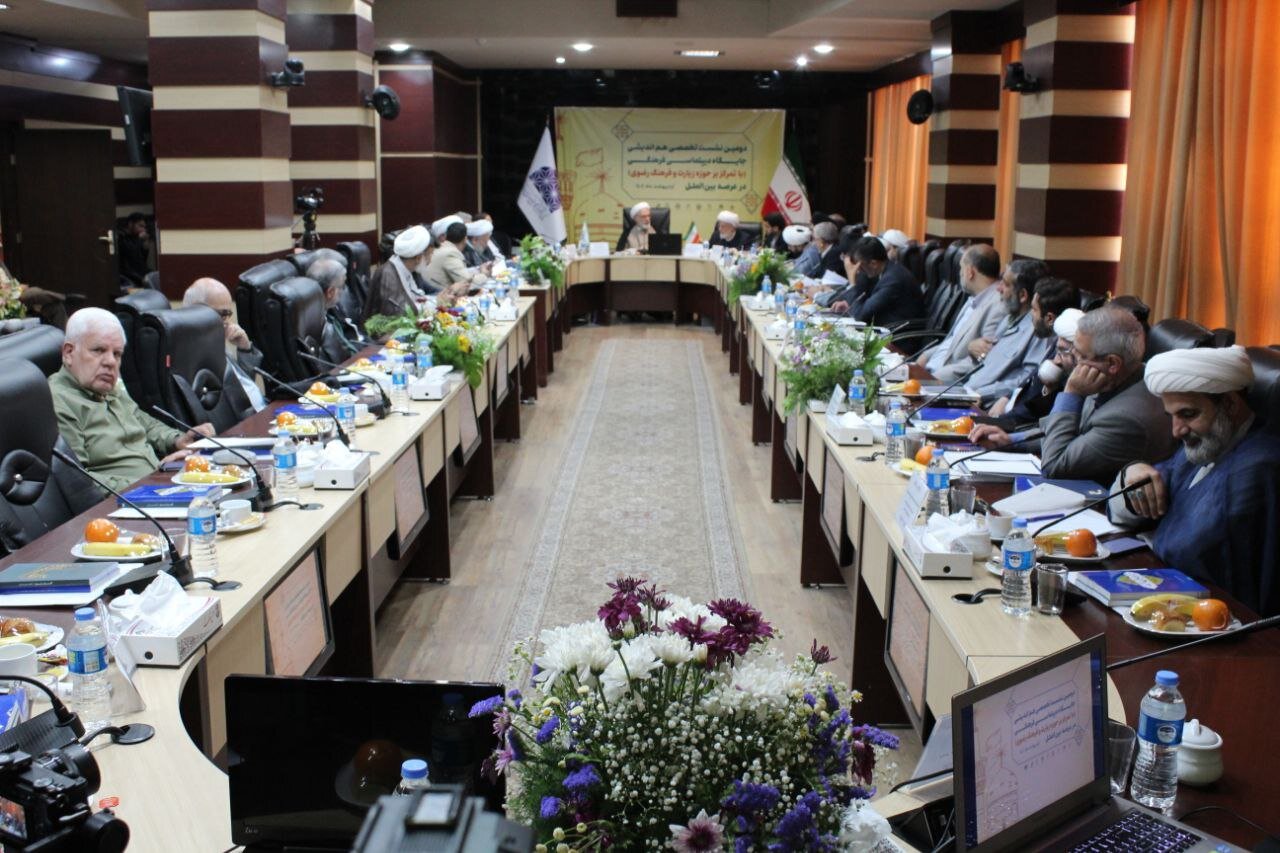Mashhad conference highlights cultural diplomacy’s role in promoting Islamic heritage worldwide

MASHHAD- The second specialized conference on the significance of cultural diplomacy, particularly in the domains of pilgrimage and Ahl al-Bayt culture, was held in Mashhad on Friday morning on the sidelines of the 21st Imam Reza (AS) International Festival.
The conference was successfully held with the participation of key officials and experts, including representatives from the Ministry of Foreign Affairs and Iran's Islamic Culture and Relations Organization (ICRO).
Building upon last year’s session, this event aimed to foster synergy among initiatives to elevate the global presence of Ahl al-Bayt and Razavi culture.
The conference featured 13 speeches that underscored the importance of expanding Iran’s soft power through cultural diplomacy. A prominent theme was the strategic role of the Razavi diplomatic sphere, emphasizing the global mission of promoting Islamic civilization and the teachings of Imam Reza (AS).
From Lebanon, Sheikh Jafar Al-Mohajer, a distinguished scholar, author, and researcher and the founder of the Baalbek-based Center for Bahauddin shared a comprehensive report on recent scholarly efforts.
“Our center has published 52 titles that provide a new, historically accurate narrative of Shia Islam, countering exaggerated and distant accounts. We aim to highlight the efforts and sacrifices of the Ahl al-Bayt, rewriting history to reflect their jihadist approach and strategic management, which transformed the course of Islamic history’” he noted.
“Amidst ongoing hardships and destruction in Lebanon, we seek international support to sustain our activities, as Hezbollah remains our primary supporter, and our center faces closure without external aid,” he explained.
For his part, Sheikh Zaid Alsalami from Australia, a member of the Ahl Al-Bayt World Assembly, addressed the challenges faced by Muslim communities in the West, particularly in Australia, where second and third-generation migrants struggle to preserve their Islamic identity amid cultural assimilation.
“Many young Muslims in Western countries are unaware of the significance of pilgrimage and the cultural heritage of Imam Reza (AS),” he explained.
“Despite numerous Islamic centers, Westernization and cultural invasion make it difficult to maintain our identity. I actively encourage youth to visit the holy sites and promote awareness through social media and translations into English,” he mentioned.
The quality of translations and the dissemination of accurate information are crucial, especially since reading habits have declined and social media dominates communication, he added.
In his remarks, Hamidreza Arbab Soleimani, Deputy Minister of Culture and Islamic Guidance highlighted Imam Reza’s wisdom, stating, “Meeting with fellow believers fosters growth and vitality, even if long intervals separate these encounters.”
“This conference serves as a valuable opportunity to develop cultural diplomacy, reminding us that our cultural mission extends beyond national borders. Islam, as a universal religion, mandates that our message benefits all humanity,” he added.
“Today, many people around the world are unfamiliar with the Quran and the Ahl al-Bayt. If Mashhad can fulfill its mission accurately and communicate this message effectively, it will serve humanity and help expand the Islamic civilization worldwide. Such gatherings play a vital role in this endeavor.”
Hassan-Ali Akhlaghi, a member of the Iranian Parliament, emphasized the spiritual importance of the Ahl al-Bayt.
Today, Iran’s Islamic Republic stands as a powerful entity on the international stage, embodying the Resistance Axis, he mentioned.
Mashhad, with the presence of Imam Reza (AS), has become a hub of social and spiritual vitality, capable of uniting the Islamic world, he said.
“We should transform Mashhad into the country’s first free scientific zone, leveraging its universities and research centers. Such academic and scientific development will bolster resistance against arrogance and imperialism.”
Also speaking at the event, Hossein Yekta, a well-known veteran of the Iran-Iraq War and public figure, underscored the centrality of martyrdom and sacrifice in the ongoing struggle between good and evil. “The international language is not just English, but the language of sacrifice and martyrdom,” he said.
“To communicate effectively with the new generation, we must adapt our methods, incorporating artificial intelligence and innovative storytelling to counter hostile narratives and promote our cause globally.”
For his part, Hamidreza Mahdavi Arfa, a Nahj al-Balagha expert discussed the nuances of cultural diplomacy, contrasting Iran’s approach with Western practices.
“In the West, cultural tools are often used for political purposes, whereas in Iran, culture itself is the goal,” he explained and added: “Imam Reza’s teachings should be recognized, particularly through pilgrimage, to be acknowledged as a civilization-builder worldwide.”
Hossein Divsalar, an official with ICRO emphasized that cultural diplomacy serves as a bridge among nations, advocating for a soft power approach rooted in peaceful coexistence. “The message of the Islamic Republic is one of civilization, peace, and intercultural dialogue,” he noted.
The conference concluded with a shared consensus on the necessity of innovative, language-sensitive outreach strategies and the importance of promoting Iran’s cultural and spiritual values on the global stage to foster unity, peace, and mutual understanding among nations.
The Imam Reza (AS) International Festival is held annually in various provinces of the country as well as in several other countries.
This festival encompasses various fields such as articles, plays or screenplays, produced shows, stories, visual arts, books, literary texts, poetry, press and digital works, and radio and television productions.
It aims at promoting artistic excellence rooted in spiritual and cultural values, inspiring artists and audiences alike.
SAB/
